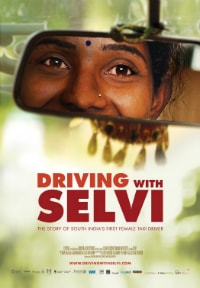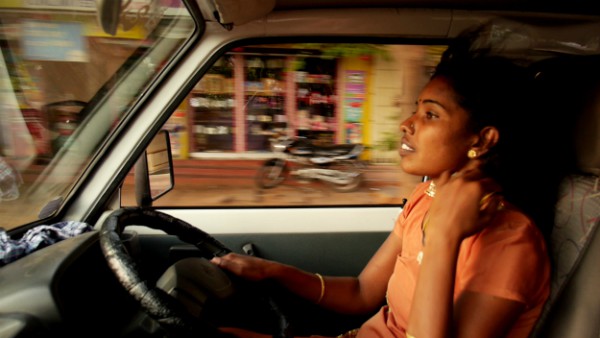
Written & Directed by Elisa Paloschi
Canada, 2015
Director Elisa Paloschi’s documentary film, Driving with Selvi, tells the story of Selvi, a former child bride who escaped an abusive marriage to become South India’s first female taxi driver. The story unfolds over ten years and provides the audience with an unobstructed view of the life of a woman born into second-class citizenry. In Driving with Selvi, Paloschi crafts the type of inspirational film that will help motivate viewers to tackle the obstacles holding them back in their own lives.
Driving with Selvi opens with a startling fact: 250 million women alive in the world today were married before they were 15 years old — one third of them living in India. The film then quickly introduces the eponymous Selvi, a shy South Indian teenager with a soft-spoken demeanour and a 1000-watt smile. When Selvi turned 14, her brother married her off to a husband who soon began abusing her. Unlike many girls in her situation, Selvi was able to escape and make her way to a woman’s shelter. It is in this period of her life where she meets filmmaker, Elisa Paloschi. Paloschi goes on to chronicle the next decade of Selvi’s life, and the audience goes along for the ride, watching Selvi evolve from a timid young girl to the strong matriarch of her own family.
The topics of child marriage, spousal abuse, and gender inequality are each central to Driving with Selvi, but Paloschi leaves these subjects on the periphery of the film, choosing instead to focus on Selvi’s courageous path towards her own self-actualization. The film never beats viewers over the head with the atrocities inflicted upon Selvi; a good portion of the film goes by before the audience has anything but the vaguest notions of the abuse that her husband inflicted upon her. Instead, Paloschi chooses to focus on the steps Selvi takes towards mending her soul and the victories that she accrues along the way — and boy does she start racking them up.
Instead of collapsing under the oppressive weight of her society’s patriarchal codes, Selvi begins challenging them. Selvi goes from simply having a drivers licence and driving a taxi to desiring mastery over every vehicle on wheels. Selvi is never happier than when she is out on the road driving, and it’s uplifting to watch someone that has suffered through so much adversity take joy in such a simple act.
Whether struggling with depression or victimized by abuse, when lost amidst the throes of suffering it is nearly impossible for people to envision their circumstances improving. The beauty of Driving with Selvi is that the film only needs an hour to share Selvi’s lifetime of perspective. Over the course of the movie, the audience sees Selvi grow from a teenager with a deep-seated mistrust of men to a woman that becomes giddy in anticipation of marrying her future husband. Selvi does more than just survive her past: she thrives, and in doing so, she sets an example for anyone that feels they are facing insurmountable adversity in their own life.
In a genre known for utilizing heavy-handed storytelling to get agendas across, Driving with Selvi works because of its subtlety. Paloschi never uses the film as a platform to preach, instead she chooses to observe Selvi’s slow march toward happiness and let the circumstances surrounding her do the talking. Though modest in scale, Driving with Selvi presents a story with remarkably high stakes. By not accepting a life of servitude, overcoming her past, and constantly challenging herself, Selvi sets an example that will inspire the audience to take steps towards conquering adversity in their own lives.
The 19th annual Toronto Reel Asian International Film Festival (Reel Asian) runs from November 5 – 15, 2015 in Toronto and Richmond Hill. Visit the festival’s official website. 




